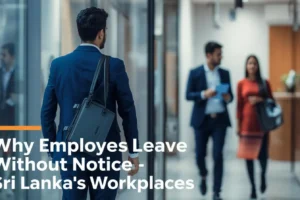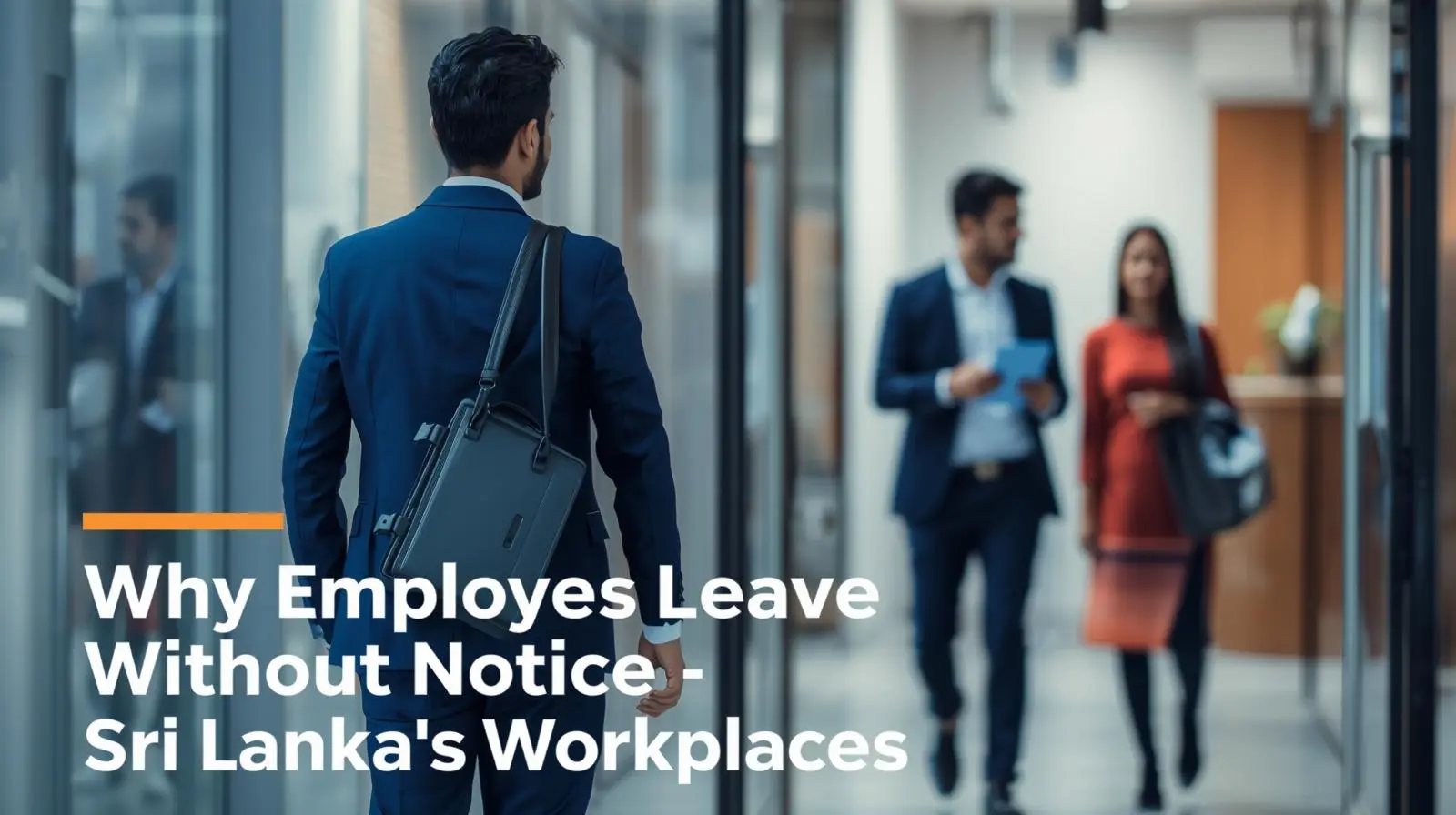It’s a scene playing out in many Sri Lankan workplaces — an employee fails to show up, HR calls, and there’s no response. Later, a message arrives: “I’ve decided to leave.” No notice. No handover. No warning.
From Gen-Z graduates in tech firms to mid-level managers in apparel, and even factory workers in the industrial sector, sudden resignations are becoming an unsettling norm.
This trend reflects deeper issues in job satisfaction, communication, and workplace culture. Understanding why employees quit without notice — and what employers can do about it — is now vital for HR and leadership teams across the country.
1. A New Reality for Sri Lankan Employers
Ten years ago, it was rare for employees to abandon jobs without giving notice. Loyalty and job security were cultural norms. But in 2025, with Gen-Z forming nearly 30% of the workforce, attitudes toward work have shifted dramatically.
Many younger workers view employment as transactional — if a job stops serving their growth or mental well-being, they move on quickly. Older workers, too, are reevaluating their priorities after economic instability and rising cost of living pressures.
According to the Colombo Labour Market Review (2024), employee attrition in private-sector SMEs rose by 18%, with more than half of resignations happening without prior notice.
➡️ External Source: Department of Labour Sri Lanka – Labour Market Reports
2. The Reasons Behind Sudden Departures
a. Unmet Expectations
The most common reason cited across industries is the mismatch between promises and reality.
Many Gen-Z workers report that the culture, work hours, or career paths promised during recruitment didn’t match the real experience.
b. Toxic or Unsupportive Leadership
Employees often don’t leave companies — they leave managers. A lack of empathy, micromanagement, or public criticism can drive staff to exit abruptly, especially when they don’t feel safe to raise concerns.
c. Poor Communication and Feedback
Gen-Z, in particular, values continuous communication. When feedback or recognition is absent, they disengage quickly.
d. Workload and Mental Health
Sri Lanka’s long working hours and limited access to wellness programs have worsened burnout. Many employees now choose mental health over money, even if that means walking away from a job unannounced.
e. Lack of Growth Opportunities
When promotions, upskilling, or salary increases stall, workers — especially younger ones — begin exploring alternatives silently and then vanish without notice.
➡️ External Source: ILO Sri Lanka – Decent Work and Youth Employment
3. Generational Trends: Gen-Z vs. Older Workers
- Gen-Z (born after 1997): More open about switching jobs frequently. They expect flexibility, feedback, and purpose-driven work.
- Millennials (born 1981–1996): Value learning and leadership opportunities. They’ll stay if they see growth potential.
- Gen-X & Boomers: Usually stay longer but may leave suddenly due to burnout, unaddressed stress, or poor communication.
Unlike previous generations, Gen-Z doesn’t feel bound by “loyalty to the company.” They value self-worth and balance over tenure.
4. The Cost of Sudden Exits
When employees leave without notice, the consequences ripple through an organization:
- Operational delays – Projects stall due to missing knowledge or incomplete handovers.
- Overloaded colleagues – Remaining staff shoulder the extra work, risking burnout.
- Recruitment costs – The average cost to replace a mid-level employee in Sri Lanka is around LKR 450,000 (CIPM 2023).
- Loss of client trust – Sudden exits can damage long-term relationships, especially in export and service industries.
The true cost isn’t just financial — it’s cultural. High turnover creates a sense of instability that discourages top talent from joining or staying.
5. Strategies to Prevent Sudden Resignations
a. Build a Culture of Transparency
Employees are less likely to disappear if they feel safe to speak up. Encourage open communication, anonymous feedback channels, and confidential counselling.
b. Redefine the Employee Value Proposition (EVP)
According to Kelaniya Journal of Human Resource Management, a strong EVP — one that includes career growth, flexibility, and recognition — can reduce turnover intention by up to 30% among Sri Lankan Gen-Z employees.
c. Conduct Stay Interviews
Instead of waiting for exit interviews, HR should hold “stay interviews” every six months to understand what keeps employees motivated and what might push them away.
d. Flexible Working & Work-Life Balance
Hybrid schedules, wellness days, and realistic workload management have proven effective in reducing impulsive resignations, especially among younger professionals.
e. Improve Onboarding & Early Engagement (Leave)
Most employees who quit without notice do so within the first six months. A structured onboarding and mentorship program can help them connect with the company early on.

“When employees vanish overnight, it’s not disloyalty — it’s a message that something in the workplace failed them first.”
The growing trend of employees — especially Gen-Z — leaving work without notice is more than a disciplinary challenge; it’s a reflection of changing workplace values in Sri Lanka. The traditional model of loyalty for job security has evolved into one that prioritizes respect, purpose, and personal growth.
From factories to offices, every sudden resignation sends a signal — about communication gaps, unmet expectations, or a lack of emotional connection. It’s a wake-up call for organizations to re-evaluate how they treat, engage, and listen to their people.
The solution isn’t tighter contracts or penalties, but stronger culture: transparent leadership, fair pay, flexible work, and genuine recognition.
When employees feel seen and supported, they don’t vanish — they stay, grow, and contribute.
For Sri Lankan employers navigating this new era, the challenge is clear: build workplaces that people choose to stay in, not ones they escape from.
6. Real-World Example: A Manufacturing Firm’s Turnaround
A mid-sized garment factory in Kegalle faced severe attrition in 2023, with nearly 25 workers quitting without notice in two months. After analyzing exit data, HR identified key pain points:
- Long shifts with no breaks
- Supervisors shouting at employees publicly
- Delays in overtime pay
In response, management:
- Introduced a Respect in the Workplace policy
- Conducted monthly well-being sessions
- Appointed worker representatives to bridge HR communication gaps
Within six months, unnotified resignations dropped by 55%, and attendance improved significantly.
This case highlights how simple human-centered policies can reduce turnover even in blue-collar environments. (Leave)
7. Looking Ahead: From Exit Culture to Engagement Culture
The phenomenon of employees leaving without notice will continue unless organizations evolve. The future lies in engagement-driven HR, not reactive HR.
Employers must embrace flexibility, recognize effort, and create purpose-driven workplaces. Meanwhile, employees — especially Gen-Z — must also learn that professionalism and courtesy in exit behavior preserve long-term career reputations.
As Sri Lanka rebuilds its economy and attracts new talent, balancing both perspectives will be key to creating sustainable, resilient workplaces.

Mr. Wajira Fernando
Group Manager - Human Resources
Puwakaramba Group of Company









